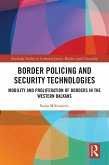Dieser Download kann aus rechtlichen Gründen nur mit Rechnungsadresse in A, B, BG, CY, CZ, D, DK, EW, E, FIN, F, GR, HR, H, IRL, I, LT, L, LR, M, NL, PL, P, R, S, SLO, SK ausgeliefert werden.
"Women, Borders, and Violence offers a refreshing approach to the study of migration and gender within the field of criminology. ... Pickering's book focuses on the migration of women within the context of the global economy, in particular, their unregulated labour and their precarious migration status. ... it offers an alternative analytical approach for criminologists writing on issues of gender, migration and borders." (Ratna Kapur, State Crime, Vol. 1.1, 2012)









